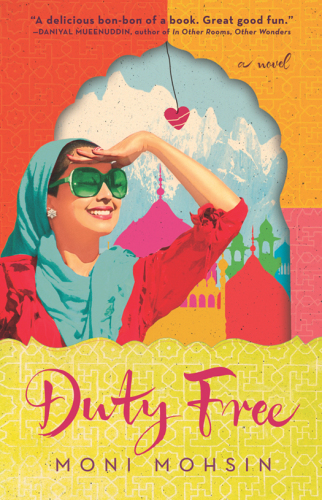
Duty Free
A Novel
- اطلاعات
- نقد و بررسی
- دیدگاه کاربران
نقد و بررسی

May 30, 2011
The lady of the house is a social-climbing shopaholic, yapping yenta, and mistress of malapropism, but her hilarious and unsettling story unfolds not in Manhattan but in Lahore, Pakistanâa land of Taliban "beardo-weirdos," shifting social mores, and a growing middle class. Mohsin's first novel to be published in America offers biting social satireâa news ticker runs atop each page with increasingly bloody and startling news-of-the-dayâand a tale of redemption, gently skewering her vacuous heroine as she transforms from elitist snob to social maverick. The evolution unfolds as the Social Butterfly is commissioned by her manipulative aunt to play matchmaker for shy, divorced cousin Jonkers. But with just two months to get him hitched to a woman with a fab "bagground," she invariably comes up with all the wrong choices: lesbian Tanya, and Tasbeeh, divorced daughter of a drug-smuggler. In the end, though, Jonkers just may find love all by himself. Mohsin writes firecracker prose and crafts a blazing voice for her Prada-mad heroine, a snappy vixen-type readers will recognize instantly, even if she's never got a cosmo in her hand.

August 15, 2011
In Pakistan-born, London-resident Mohsin's U.S. debut, an affluent Lahore housewife reluctantly seeks a suitable bride for her nerdy cousin Jonkers.
Really, it was mean of her Aunty Puzzy to pressure our unamed narrator into helping with this daunting task. Sure, the family has plenty o f money, thanks to Uncle Kaukab's stint as "chief of central board of revenew" in the '80s, but Aunt Pussy wants Jonkers "to make a big marriage, na, to a nice rich, fair, beautiful type from an old family." He wants to marry for love and actually asks his cousin if she is happily wed. Well of course! Husband Janoo may spend a lot of time in "his bore village" and seem disappointed that his empty-headed spouse displays no shred of social conscience or glimmer of intellect as Pakistan goes to pieces in late 2009. What does she care? She has "a big house, servants, social life, status, cars, cupboards full of designer joras and jewellery, and so on and so fourth." If only the "beardo-weirdos" would quit setting off bombs and threatening girls' schools, she could seriously enjoy shopping and hanging out with her equally status-conscious girlfriends. Our heroine's solipsistic diary entries aren't quite as hilarious as the author imagines, though her mix of Urdu and English filled with misspellings and malapropisms gives a tangy sense of her semi-educated, privileged mindset. Readers may not feel terrible when the narrator and a friend are robbed at gunpoint as they're having "a good old goss" in her car while a servant buys them fruit. But just as we're about to write her off, she proves to have a heart and decides to defend the hardworking travel agent Jonkers has fallen for against snobbish Aunty Pussy. Her discovery of an ethical core is a trifle sudden, but Mohsin's tale is good-natured enough so that we're happy it ends with a wedding and reconciliations all around.A zesty South Asian accent gives this lightweight romp some heft.
(COPYRIGHT (2011) KIRKUS REVIEWS/NIELSEN BUSINESS MEDIA, INC. ALL RIGHTS RESERVED.)

September 1, 2011
In popular Pakistani novelist Mohsin's American debut, our unnamed narrator, a Lahore socialite, counts among her many tasks: orchestrating servants, attending weddings and luncheons, shopping the latest from Choo and Prada, steering clear of the metropolis' many beardo-weirdos, and making sure her son is on the right track to get into a foreign college. Then, on this already overloaded head, her aunt places yet another hat: that of matchmaker for her son. The novel is told in a conversational, journal-like format, and readers can hear the narrator's flippant attitude through her accented English and feel the mounting pressure to find her cousin a mate before year's end with each dated entry. An incorrigible gossip, the narrator keeps things between you, me and the four walls; and the author's tongue-in-cheek, deliberate butchering of the narrator's language is entertaining. Although references are generally innocuously presented and the novel's ending expectedly happy, Mohsin notes hard realities of the marriage practices, values-clash, and economic and political woes of modern Pakistan through a few background characters and a CNN-style newsreel atop each page.(Reprinted with permission of Booklist, copyright 2011, American Library Association.)




دیدگاه کاربران